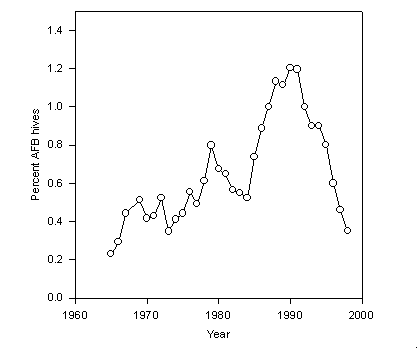
|

|
by Peter Sales
Member PMS Review Committee
In essence the Deca is an agreement between the NBA (management agency) and the beekeeper on the"best practice" to deal with AFB. For most this is merely formalising the practices they already follow, but for some who have a significant problem with AFB, they may have agreed to change their procedures in order to make their disease control more effective.
Based on what we know about the disease, and how to eliminate it, if you follow proven management techniques, this will result in a steady reduction in AFB incidence. In the AFB manual, provided to DECA holders, there are examples of how this has been accomplished in beekeeping outfits in recent times.
Do the right things for a few years and disease is history. Of course for years most of us have thought we WERE doing all we could and that a certain amount of disease was inevitable, after all it just kept coming up. Apart from anything else, a constant or increasing AFB level is very demoralising.
In contrast, to see the level of AFB decreasing steadily nation wide over the last few years is cause for satisfaction and should give heart to those who still believe this is something we can't beat.
That's a fantastic improvement and results in more profitable beekeeping.

The percentage of hives in New Zealand reported to have AFB each year.
The current strategy, although it has its critics, is a recipe for continued success. Some of these critics object to it because of their conviction that the elimination of AFB is not possible. Sadly the belief itself may be one factor in a self fulfilling prophesy that may see some beekeepers tolerating continuing levels of AFB , when changes in practice could see elimination of disease as a realistic goal for them also.
I personally believe that elimination of AFB in managed beehives is achievable within the next decade. At the time we began developing our PMS, we set an objective of a 10% reduction of AFB per annum. At the time , some people suggested the objective wasn't achievable.
However, in the last seven years, we have met or exceeded that figure in all but one year, and over the period have reduced AFB incidence in New Zealand by an average of 12% per annum. No other beekeeping country has been able to show such an abrupt and sustained decline in AFB levels, and this decline gives me confidence that AFB elimination is a distinct possibility
In reality because the contractor has to process, and possibly contact you and modify your DECA, you will need to apply well before then. The contractor will send out COI forms in August to all those beekeepers who have not obtained DECA's, as under the strategy those beekeepers are required to have their hives inspected between August 1st and November 30th. Under the PMS, those without a DECA must have their hives inspected by someone who has a DECA. This could incur some expense unless you have another beekeeper who is a DECA holder prepared to do this for you for free. For those with a few hives this is possibly a realistic option. You do not have to have a DECA, but if you do there are two immediate advantages.
1.You will receive a free copy of the 80 page Manual for disease elimination.
2. You will not be required to complete a certificate of inspection each spring.
If you apply for your DECA after August 1st and have it approved before the return date of the Certificate of Inspection's ( December 15th), then the COI you have received will be waived.
If you do not hold a DECA, and fail to have your hives inspected by a qualified person and return a COI by the due date, then you would be in breach of the PMS and Biosecurity Act. After due process of notice and law, you could be liable to pay for any inspection work done on your hives by the management agency contractors. It is hoped no beekeepers find themselves in that situation.
To reach the goal of AFB elimination it is essential that all hives are inspected by competent beekeepers every year. The incidence of AFB is at historically very low levels, and now is the perfect opportunity to see it gone for good. The strategy will however only succeed if we all play our part.
I would like to take this opportunity, on behalf of the PMS review committee, to thank all beekeepers for their patience and tolerance over this implementation phase of the PMS. It is a continuing learning curve for both the NBA and our contractors, Agriquality NZ and Hort Research. The process is being undertaken with a spirit of goodwill and cooperation between the parties, which bodes well for the future of the strategy.
Home NZ Bkpg Bee Diseases Organisation Information Contacts
, webmaster of the site...